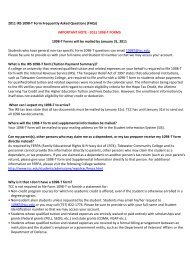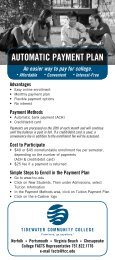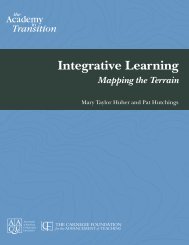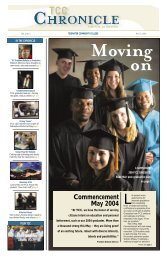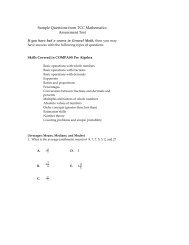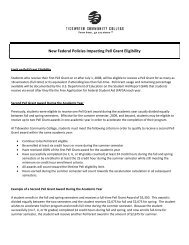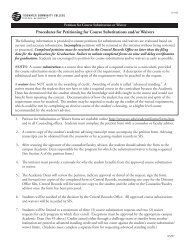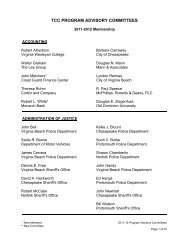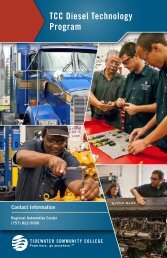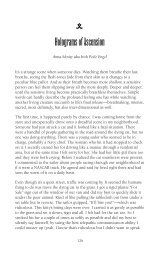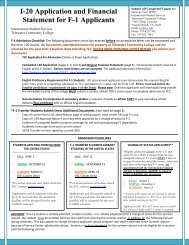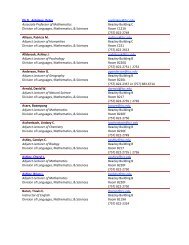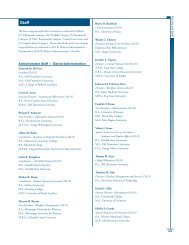CAREER AND TECHNlCAL EDUCATlON - Tidewater Community ...
CAREER AND TECHNlCAL EDUCATlON - Tidewater Community ...
CAREER AND TECHNlCAL EDUCATlON - Tidewater Community ...
- No tags were found...
Create successful ePaper yourself
Turn your PDF publications into a flip-book with our unique Google optimized e-Paper software.
GENERAL INFORMATIONSTUDENT OUTCOMES ASSESSMENT REQUIREMENTAs a part of the college’s efforts to improve institutional effectiveness,students may be required to take tests or complete surveys designed tomeasure student learning in general education or selected majors priorto graduation. Work products submitted by students to fulfill courserequirements may also be collected and evaluated. These assessmentactivities evaluate the college’s academic programs and general educationrequirements. Test results are confidential and aggregated across curricula.No minimum score or level of achievement is required for graduation.General Education RequirementsGeneral education requirements address the knowledge, skills, attitudes,and values characteristic of educated persons. They are unbound bydisciplines and honor the connections among bodies of knowledge. TCCdegree graduates will demonstrate competency in the following generaleducation areas:• Communication• Critical Thinking• Cultural and Social Understanding• Information Literacy• Personal Development• Quantitative Reasoning• Scientific ReasoningTCC’s associate degree programs support a collegiate experience thatfocuses on the above definition and attendant areas. Degree graduates willdemonstrate competency in the following general education areas:1. CommunicationA competent communicator can interact with others using all formsof communication, resulting in understanding and being understood.Degree graduates will demonstrate the ability to:• understand and interpret complex materials;• assimilate, organize, develop, and present an idea formallyand informally;• use standard English;• use appropriate verbal and non-verbal responses in interpersonalrelations and group discussions;• use listening skills; and• recognize the role of culture in communication.2. Critical ThinkingA competent critical thinker evaluates evidence carefully and appliesreasoning to decide what to believe and how to act. Degree graduateswill demonstrate the ability to:• discriminate among degrees of credibility, accuracy, andreliability of inferences drawn from given data;• recognize parallels, assumptions, or presuppositions in any givensource of information;• evaluate the strengths and relevance of arguments on aparticular question or issue;• weigh evidence and decide if generalizations or conclusions based onthe given data are warranted;• determine whether certain conclusions or consequences aresupported by the information provided; and• use problem solving skills.3. Cultural and Social UnderstandingA culturally and socially competent person possesses an awareness,understanding, and appreciation of the interconnectedness of thesocial and cultural dimensions within and across local, regional, state,national, and global communities. Degree graduates will demonstratethe ability to:• assess the impact that social institutions have on individualsand culture—past, present, and future;• describe their own as well as others’ personal ethical systemsand values within social institutions;• recognize the impact that arts and humanities have uponindividuals and cultures;• recognize the role of language in social and cultural contexts; and• recognize the interdependence of distinctive world-wide social,economic, geopolitical, and cultural systems.4. Information LiteracyA person who is competent in information literacy recognizes wheninformation is needed and has the ability to locate, evaluate, and use iteffectively. Degree graduates will demonstrate the ability to:• determine the nature and extent of the information needed;• access needed information effectively and efficiently;• evaluate information and its sources critically and incorporateselected information into his or her knowledge base;• use information effectively, individually, or as a member of agroup to accomplish a specific purpose; and• understand many of the economic, legal, and social issuessurrounding the use of information and access and useinformation ethically and legally.5. Personal DevelopmentAn individual engaged in personal development strives for physicalwell-being and emotional maturity. Degree graduates will demonstratethe ability to:• develop and/or refine personal wellness goals; and• develop and/or enhance the knowledge, skills, and understandingto make informed academic, social, personal, career, andinterpersonal decisions.6. Quantitative ReasoningA person who is competent in quantitative reasoning possesses theskills and knowledge necessary to apply the use of logic, numbers, andmathematics to deal effectively with common problems and issues. Aperson who is quantitatively literate can use numerical, geometric, andmeasurement data and concepts, mathematical skills, and principles ofmathematical reasoning to draw logical conclusions and to make wellreasoneddecisions. Degree graduates will demonstrate the ability to:• use logical and mathematical reasoning within the context ofvarious disciplines;• interpret and use mathematical formulas;• interpret mathematical models such as graphs, tables andschematics, and draw inferences from them;• use graphical, symbolic, and numerical methods to analyze,organize, and interpret data;• estimate and consider answers to mathematical problems inorder to determine reasonableness; and• represent mathematical information numerically, symbolically,and visually, using graphs and charts.TIDEWATER COMMUNITY COLLEGE • CATALOG 2013-1425GENERAL INFORMATION



